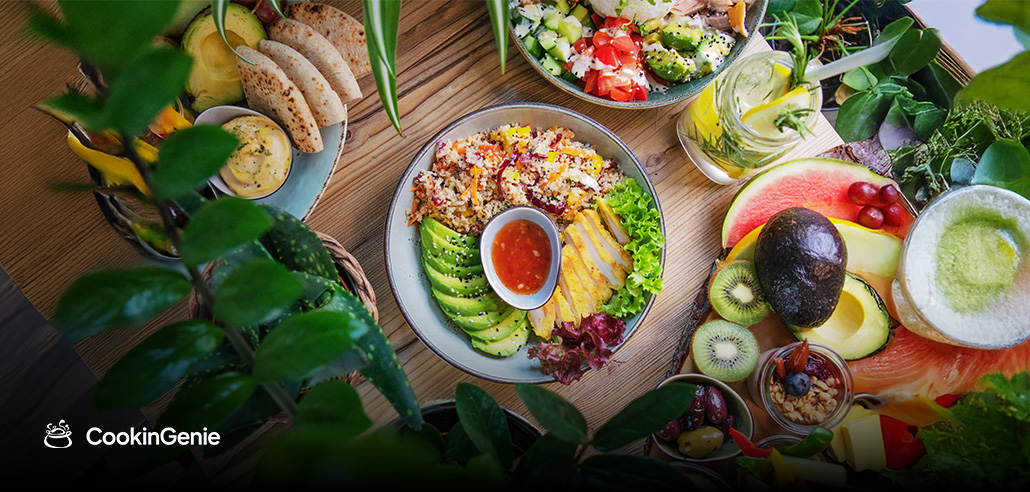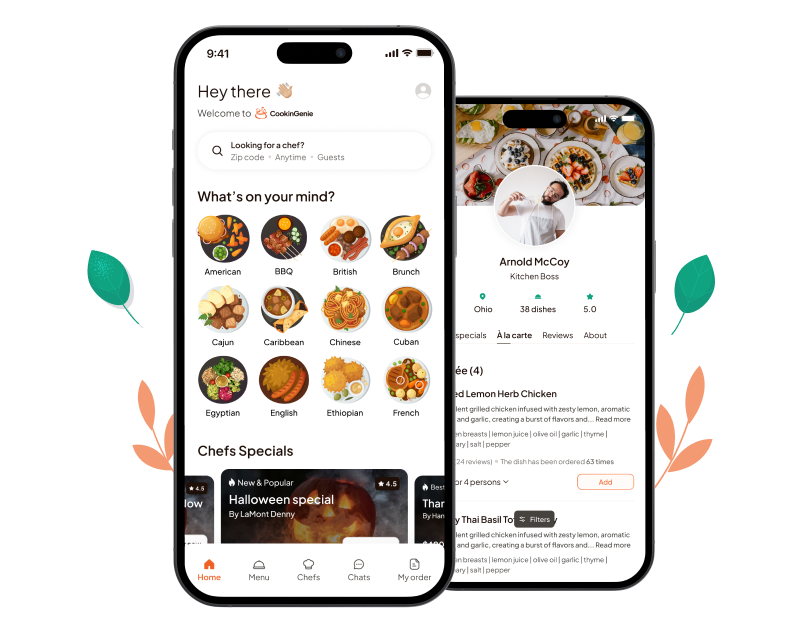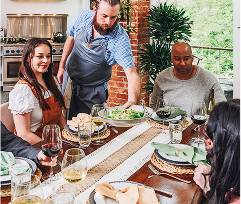How to Switch to Plant-Based Diets and Sustainable Eating
A plant-based diet focuses on consuming whole, unprocessed plant foods. This diet includes fruits, vegetables, beans, legumes, whole grains, nuts, and seeds. A growing body of research has shown that plant-based diets offer numerous health benefits, including reducing the risk of heart disease, diabetes, and certain types of cancer.
They are also more environmentally sustainable than diets that include animal products. As the world population grows, finding ways to produce nutritious and planet-friendly foods is becoming essential. Plant-based diets offer a promising solution.
The environmental impact of our food choices
What we choose to eat has a direct impact on the environment. How our food is produced, transported, and consumed has an environmental cost. Farming on an industrial scale is one of the most significant contributors to environmental degradation.
This farming is highly wasteful and uses copious amounts of water, land, and energy. It also generates a lot of pollution, including greenhouse gases and toxic chemicals. Eating less meat and dairy is one way to reduce the environmental impact of our food choices. Plant-based diets require less land, water, and energy to produce than diets that include animal products. They also generate fewer greenhouse gases.
Another way to reduce our environmental impact is to eat more sustainably. Sustainable eating means choosing local, seasonal produce and wasting less food. It can also mean supporting farmers who use sustainable practices. By making conscious choices about what we eat, we can help to protect the environment.
What are the benefits of a plant-based diet?
A plant-based diet improves overall health and reduces the risk of chronic diseases such as heart disease, obesity, diabetes, and cancer. Plant-based diets are also associated with lower greenhouse gas emissions than diets that include meat and dairy products.
Is a plant-based diet restrictive?
While you may think a plant-based diet is restrictive, it has many delicious and nutritious options. With some creativity, you can easily find plant-based versions of your favorite foods.
Are sustainable foods more expensive?
While it is true that some sustainable foods (such as organic produce) can be more costly than conventionally grown foods right now because of scale, there are many ways to eat sustainably on a budget. For example, buying bulk or growing your food can help reduce costs.
What’s the difference between a vegetarian and vegan diet?
Both vegetarian and vegan diets focus on plant foods, but some key differences exist. Vegetarians may eat dairy products, while vegans do not consume any animal products.
How do I transition to a sustainable, plant-based diet?
Transitioning to a sustainable, plant-based diet can be easy, depending on your approach. You may prefer to make gradual changes over time, while others may choose “cold turkey.” Many resources are available to help you make the transition smoothly and successfully. This blog is a good starting point.
Making sustainable eating choices
As the world becomes more aware of the importance of sustainability, most of us are looking for ways to make sustainable eating choices. A plant-based diet is one way to eat more sustainably. Here are some tips for making sustainable eating choices.
- Shop locally and seasonally: Buying locally grown food reduces your carbon footprint and supports local farmers. Seasonal produce is also typically fresher and tastier than out-of-season options.
- Buy organic: Organic foods are grown without harmful pesticides and fertilizers. They are also often more environmentally sustainable than conventionally grown foods.
- Avoid food wastage: An estimated one-third of all food produced globally gets wasted annually. Reducing food waste is essential for both environmental and economic reasons. There are many simple ways to waste less food, such as meal planning or storing food properly.
- Eat less meat: Meat production significantly contributes to greenhouse gas emissions, so eating less meat can help reduce your carbon footprint. If you eat meat, choose sustainably raised options that have been certified humane by a reputable organization such as the Global Animal Partnership.
- Prefer non-GMO products: GM crops (Genetically Modified Crops) are typically grown with harmful pesticides and herbicides, so choosing non-GMO options helps reduce exposure to these toxins. Know your country’s GMOs and food labeling laws before purchasing. Additionally, many countries have laws to label foods containing GMOs. So familiarizing yourself with these laws can help you make informed choices about the food you purchase.
- Support sustainable companies: Buying from companies that are committed to sustainability helps to encourage more sustainable practices across the food industry. Look for companies that support fair labor practices, environmentally friendly packaging, and organic pesticides for farming.
Sustainable eating can be easy and inexpensive. By following these simple tips, you can make good choices for yourself and the planet.
The benefits of a plant-based diet
A plant-based diet is not only healthy for your body, but it is also sustainable and environmentally friendly. Here are certain benefits of a plant-based diet:
- Improved health: A plant-based diet reduces the risk of heart disease, stroke, cancer, and other chronic diseases.
- Reduced environmental impact: Industrialized farming is one of the leading causes of environmental degradation. By eating a plant-based diet, you can help to reduce the demand for these products and lessen your ecological footprint.
- Enhanced animal welfare: Animals raised for food on factory farms are subject to horrific conditions. A plant-based diet helps to reduce the demand for these products and improve the lives of animals.
- Efficient use of resources: It takes far fewer resources to produce a pound of plants than a pound of meat. This comparison shows that a plant-based diet is more efficient regarding land, water, and energy use.
- Improved sustainability: A plant-based diet is more sustainable than a meat-based diet in terms of greenhouse gas emissions, water use, and soil erosion.
- Delicious and nutritious: Plant-based foods are healthy for you and can also be delicious and nutritious. There are endless possibilities when preparing meals with fruits, vegetables, whole grains, and legumes.
Popular plant-based dishes
A sustainable, plant-based diet is environmentally friendly, humane, and healthy. Such a diet can help protect the planet and its resources while promoting human health and animal welfare. Many delicious and nutritious plant-based recipes can fit into a sustainable diet. Some of the popular dishes are given here.
- Quinoa and Black Bean Burritos: These are packed with protein and fiber, making you feel full and satiated. You can prepare and freeze it for an easy meal on busy days.
- Thai Coconut Soup: This soup is light but flavorful and comes together quickly with just a few ingredients. It is perfect for a summer evening meal.
- Lentil shepherd’s pie: This hearty dish is comfort-food at its best. It is packed with vegetables and protein-rich lentils, making it very filling.
- Roasted cauliflower tacos: Tacos are an excellent way to get your daily dose of vegetables. They are flavorful and crispy and can be made ahead of time for a quick meal.
- Eggplant Parmesan: This classic Italian dish is delicious without being heavy. It is perfect for a weeknight dinner when you want something healthy but still satisfying.
- Chocolate avocado mousse: This mousse is rich and decadent but made with healthy ingredients like avocado and cocoa powder. It is the perfect guilt-free treat!
Tips for transitioning to a sustainable, plant-based diet
Transitioning to a plant-based diet can be a challenge, but it is worth it for the sake of your health and the planet. Here are some tips to help you make the switch.
- Start slowly and ease into it: If going cold turkey on animal products is not your thing, that is OK. Why not start by incorporating one meat-free meal into your week? Slowly but surely, you will get there.
- Plan: When it comes to meals, always have a backup plan in case you get hungry. This backup plan means carrying snacks or packing your meals whenever you go out.
- Educate yourself: Learning about the benefits of plant-based eating is a great motivator to stick with it. Not to mention, the more you know about nutrition, the better equipped you will be to make good choices regarding what you eat.
- Find a support system: Whether it is friends, family, or an online community, surround yourself with people who support your decision to eat more plants. When you feel tempted to stray from your new diet, having someone to talk to can be a huge help.
- Be patient with yourself: Making lasting change takes time, so do not expect perfection overnight. The important thing is that you are moving in the right direction and progressing toward your sustainable eating goal.
Challenges in eating sustainably
A shift to sustainable eating habits is essential to preserving our planet for future generations. However, sustainable eating can be challenging, and many barriers prevent us from making the switch. Below are some of these challenges of sustainable eating and how to overcome them.
- Access to healthy food: One of the biggest challenges of sustainable eating is access to healthy food. Healthy food is often more expensive and less accessible than unhealthy junk food. However, there are ways to eat healthy on a budget, and many community programs help access healthy food.
- Time: You may find it challenging to cook meals from scratch because of time constraints. However, you can prepare many quick and easy recipes with sustainable ingredients. Planning and batch cooking can also help save time in the kitchen.
- Lack of knowledge: Another challenge of sustainable eating is how to cook sustainably or where to find sustainable ingredients. Many resources are available online and in libraries that can help with this. In addition, many communities offer cooking classes or farm-to-table dining experiences that can teach you about sustainable eating habits.
- Social pressure: Finally, social pressure can be a big challenge when eating sustainably. Friends or family members who do not understand your choices can cause stress. Standing firm in your convictions and respecting those with different dietary needs and preferences is essential. You can still enjoy social gatherings by bringing your food or finding sustainable alternatives.
By overcoming these challenges, you will be on your way to eating sustainably and positively impacting the environment!



 Settings
Settings
 Gift Card
Gift Card Blog
Blog Locate Us
Locate Us










 Home
Home
 Chefs
Chefs
 Chats
Chats
 My Order
My Order



